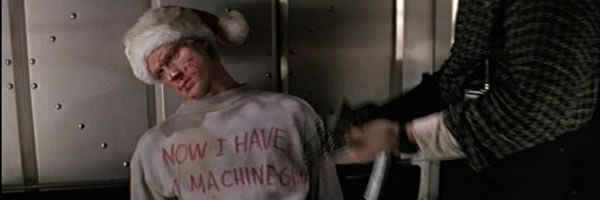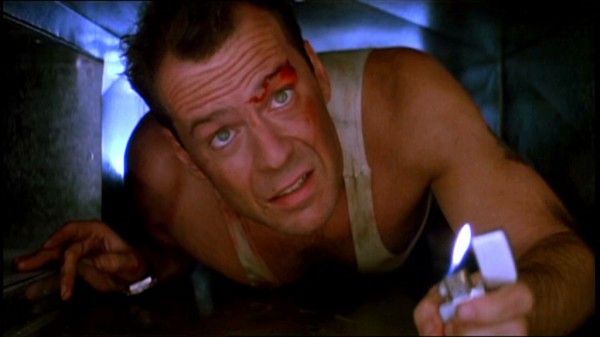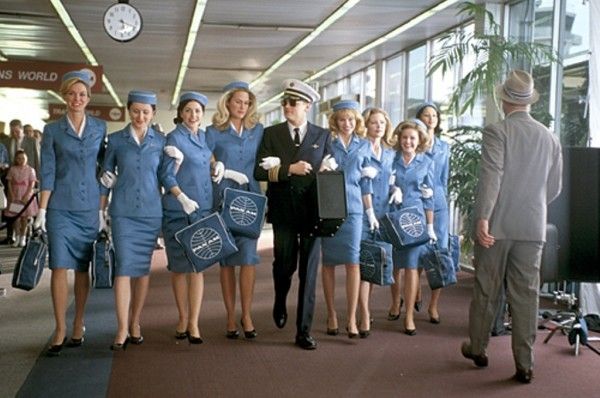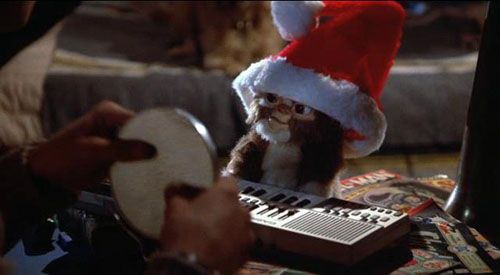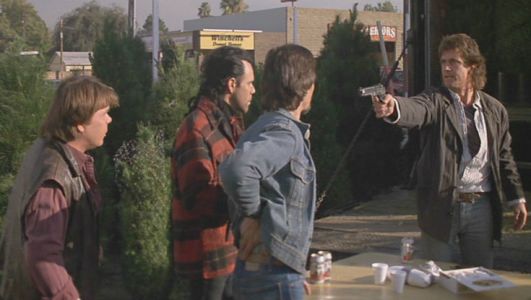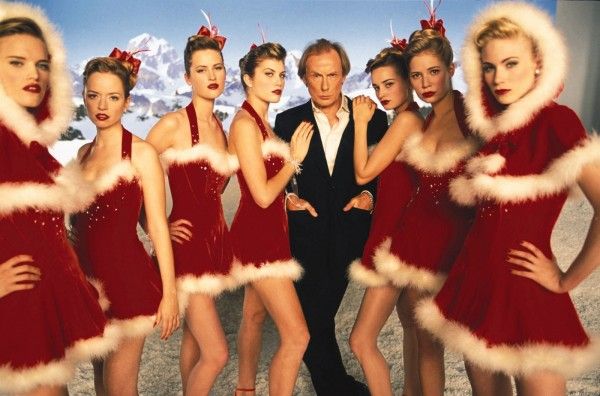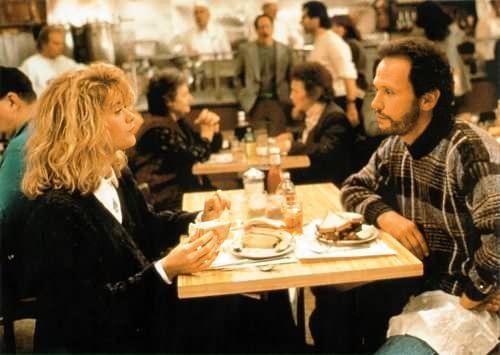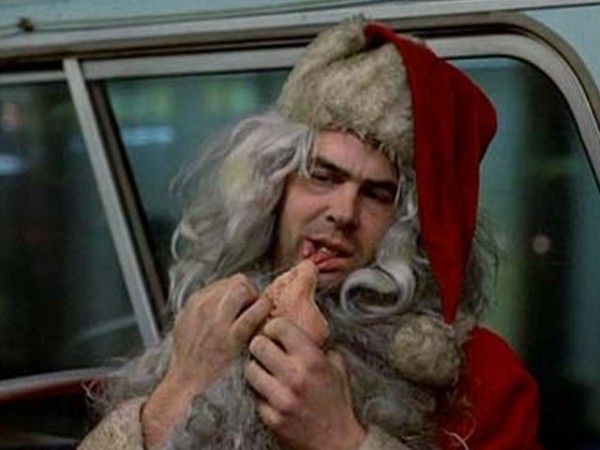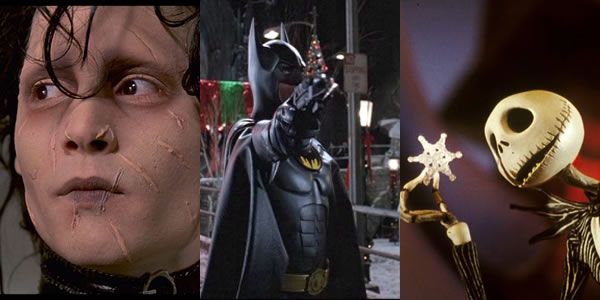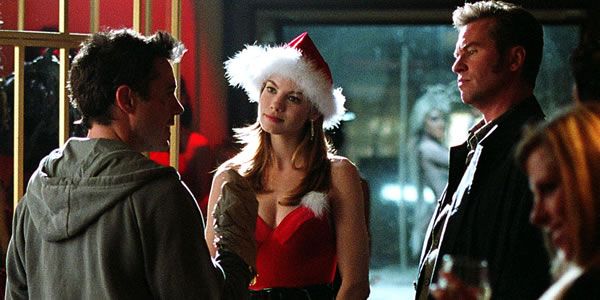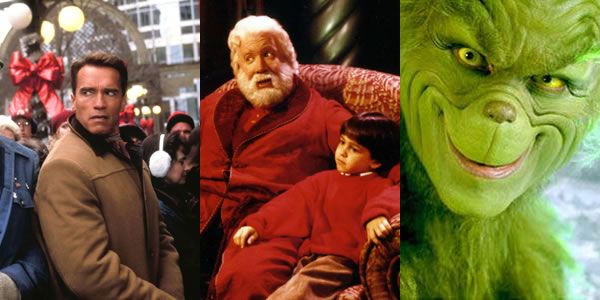With every favorites list – be it book, TV, or film – comes a bit of controversy. Several titles make the list that many feel shouldn’t have, while others are excluded that probably deserved mention. Last week we posted our Top 10 Christmas films, which more or less covered the films we felt reflected the spirit of the holidays. Due to the popularity (or lack thereof) of that list, we decided to put together an alternate Holiday Films collection without the constraints imposed upon the original list. In this instance we were free to include any and all films that took place within the holiday, whether they exuded a radiance of yuletide spirit or not. So, without further ado, hit the jump for Collider’s Alternate List of Christmas Films.
1.) Die Hard (1988) and Die Hard 2 (1990)
Nothing captures the spirit of the holidays quite like John McClane. The man doesn’t sing carols, drink hot chocolate, or wrap presents for the kiddies on Christmas Eve, but only because he’s too busy slugging it out with the local terrorists – namely Alan Rickman’s snaky Hans Gruber – atop LA's Nakatomi Plaza.
As embodied by Bruce Willis in John McTiernan’s outstanding Die Hard, McClane is a no-nonsense, kick ass portrait of the “average” man, forced to take matters into his own hands to save his wife Holly (Bonnie Bedelia) from certain death. Utilizing quick wit and a smart ass, go-for-broke attitude, McClane single handedly (and effortlessly) takes on Gruber’s entire army, fights off the feds, leaps across elevator shafts, smashes through windows (barefoot no less), restores his marriage, saves actor Reginald VelJohnson from the clutches of the vile Steve Urkel, and escapes an exploding sky rise whilst tied to a fire hose long before Santa Claus has even thought about rising from his plush, little elf-made bed. I’d say McClane deserves a nice Christmas bonus – and by bonus I don’t mean a lifetime membership to the jelly-of-the-month club.
A few Christmas Eves later McClane took on Death from Bill and Ted’s Bogus Journey in Renny Harlin’s quick-cash follow-up Die Hard 2: Die Harder. The results were less than staggering; at least when compared to McTiernan’s film, but still enjoyable.
Two more sequels followed, but none quite captured the essence (or simplicity) of the original Die Hard, which dutifully earns the title of “Greatest Action Film” ever made, what with its spectacular pyrotechnics, and endless gun battles. “Greatest Christmas Film” ever? That trophy belongs to A Christmas Story if you ask me. Still, it’s not quite the holidays until John McClane exclaims, “Yippee kai yay mutherfucker!”, or “Yippee kai yay Mr. Falcon”, as it is typically heard on TBS.
2.) Catch Me If You Can (2002)
The bulk of Steven Spielberg’s terrific caper comedy Catch Me If You Can takes place during various parts of the year, but several chapter breaks occur on or around Christmas Day, which is good enough for me in terms of its inclusion on this list. Catch Me If You Can is a damn fine film, and remains one of The Beard’s absolute bests. Whenever images of Shia Lebeouf swinging through the vines with CGI monkeys pop into my head, I close my eyes and remember the magical year of 2002 when Spielberg crafted the hypnotically exciting Minority Report and then had the good sense to lighten up with his account of master criminal/con-artist Frank William Abagnale, Jr. As portrayed by Leonardo DiCaprio, Frank remains a likeable thief throughout, utilizing his natural intelligence (and charm) to rip off banks via check fraud in an attempt to repair his broken family (namely his father, Frank Sr., delicately portrayed by Christopher Walken). His actions allow him to fly (for free) around the globe, posing as a Pan Am pilot, earning him the nickname the “James Bond of the sky,” which in turn affords him all-nighters with both Jennifer Gardner and Grey’s Anatomy-star Ellen Pompeo (lucky bastard). Tom Hanks lends tremendous support, portraying Carl Hanratty, the FBI agent who tracked down and eventually captured Frank (on Christmas Eve), and then added him to his squad of paper pushing “G-men.” While Jeff Nathanson’s script takes a few liberties with Frank’s true life experiences, Catch Me If You Can remains a remarkably entertaining, even honest, film – one perfectly fit for the holiday crowd.
3.) Gremlins (1984)
I haven’t seen Joe Dante’s holiday creature-feature Gremlins since I was a kid, but I remember it well. At turns terrifying and hysterically funny (not to mention slightly demented), the story of a small town run amok with the titular beasties remains a holiday favorite in devout film circles. Spawned from a small furry creature known as a Mogwai, the gremlins offer mischievous mayhem in the most abominable sense. People suffer horrific deaths; monsters blow up in microwaves, throw old ladies out windows, and then take the time to stop and enjoy Snow White and the Seven Dwarfs. It’s all in good fun, of course; and Dante, writer Chris Columbus, and executive producer Steven Spielberg have a ball concocting the grisly comic-violence on display, which (along with Indiana Jones and the Temple of Doom) led to the formation of the esteemed PG-13 rating. But is Gremlins a holiday classic? That’s for you to decide. Personally, of Dante’s films, I’ve always admired the Tom Hanks flop The ‘Burbs most, but maybe that’s because I haven’t the stomach for gruesome comedy. Then again, as a demented holiday treat, Gremlins works mainly because it refuses to cater to audiences such as myself. A sequel wrapped in a lighter (and funnier) tone was released in 1990, but couldn’t match the popularity of its predecessor, despite some slick new creature designs and a talking gremlin. Newbies be warned: while funny and containing a high supply of entertainment value, Gremlins is not for the faint of heart and probably not the best treat for a 4-year old on Christmas Eve. And for the love of god remember: no food after midnight!
4.) Lethal Weapon (1987)
When Lethal Weapon 4 hit theaters, my friends and I held a marathon in which we spent the day watching the entirety of detectives Riggs and Murtaugh’s exploits. The day started out great, but by the third entry in Richard Donner’s trilogy, the formula had already worn thin; and I could only watch in aghast as Jet Li more or less swiped Lethal Weapon 4 from the firm grasp of a tired-looking Mel Gibson and Danny Glover. Still, despite the series’ decreasing value, the original Lethal Weapon continues to amaze and entertain as the quintessential buddy/cop movie of the late 80s/early 90s. Donner’s actioner, a rough n’ gritty crime drama sprinkled with vestigial amounts of humor, combined the fiery talents of Gibson with Glover’s more formidable personality. With the help of a solid Shane Black script, the pairing proved quite successful, spawning an even better 1989 sequel, before the series plummeted to sub-standard fare. Like Die Hard, the setting of the film takes place during the Christmas season, which provides little in the way of plot, accept to provide the film with one of its best lines: as the main protagonist Joshua (played by Gary Busey) searches through Murtaugh’s house he happens upon 1951’s Scrooge playing on the TV; when Ebenezer asks, “What day is it?” Joshua blasts the TV and shouts, “It’s damned Christmas!”
The plot of the film involves top secret Vietnam spooks, prostitutes, and something about a “shipment”, but the bulk of the story centers on Gibson’s suicidal Martin Riggs (“I don’t make things complicated. That’s just how things get all on their own”), who is labeled a “lethal weapon” and partnered up with family man Roger Murtaugh (“I’m too old for this shit!”). Together, the duo track down Joshua and his roguish boss (Mitchell Ryan), and bond amidst a flurry of bullets, explosions, bare-knuckle fist fights, and spectacular chase-scenes. It all cultivates in a warm-hearted, even spirited ending that affords Lethal Weapon a deserving slot on the list.
5.) Love Actually (2003)
I was surprised at how many people actually like this movie – here I thought I was the only one. The British ensemble comedy concerns a handful of lively chaps who discover love in a variety of ways. Hugh Grant takes top billing, but it’s the slighter stories, those involving Colin Firth, Alan Rickman and Emma Thompson, that carry the most weight. Set amidst the holiday season, Love Actually wears its heart on its sleeve, more intent on inducing tears than telling a meaningful story. Still, the cast is quite brilliant; it helps to have Bill Nighy in top form as a crude, self-demeaning rock n’ roll star. And of course there’s the lovely Keira Knightley, angelic in a small, but memorable roll as a newlywed who unwittingly instills feelings on her husband’s soft-spoken best friend. Love Actually is a solid date movie for mature couples seeking a reprieve from standard holiday fare.
6.) When Harry Met Sally… (1989)
Speaking of Meg Ryan, I would be remiss if I didn’t include Rob Reiner’s comedy tour de force on this list, especially since it too contains key moments involving the holiday season. New Years plays a prominent role, but Christmas figures into the plot in more ways than one, not the least involves Sally (Ryan) buying a Christmas tree alone, contrasting against the previous year in which she and then “best friend” Harry (Billy Crystal) purchased one together. This scene typifies the conflicting nature of their relationship … ah, who am I kidding? I just wanted to include the film on this list, because, well, it’s a terrific romantic comedy, one that my wife and I watch every Christmas Eve. Others have tried, but few have successfully dissected the subject of relationships as astutely as Reiner’s genial blockbuster. Crystal and Ryan are great, the script by Nora Ephron sharp – and watch out for that killer orgasm scene (“I’ll have what she’s having!”). They really don’t make them like this anymore.
7.) Trading Places (1983)
At the height of his career, Eddie Murphy displayed genuine comedic sensibilities. Now he mostly just phones it in – actually, he’s been phoning it in for at least two decades. Regardless, Trading Places unites him with director John Landis and fellow SNL star Dan Akroyd to predictably hilarious results. The plot follows a pair of rich tycoons (played by Ralph Bellamy and Don Ameche) who wage a bet to see if they can change an individual by placing them in diverse financial conditions. As such, Akroyd, a rich, budding managing director, “trades places” with Murphy’s poor, slum-living vagabond; and each man must cope with their newfound situation. Of course, neither Akroyd nor Murphy’s characters knows about the set up, and … well, you get the gist. Jamie Lee Curtis provides solid comedic support, playing a prostitute who isn’t afraid to let it all hang out. The film was an enormous box office hit, even more so when you consider its R-rating. Akroyd, at the time a willing comedian, gives a terrific riches-to-rags-to-riches performance; his chemistry with Curtis is passable, if not laugh-inducing (in a good way). His drunken Santa bit (where he stuffs his pants full of food), years ahead of Billy Bob’s Bad Santa, remains hysterical even by today’s standards. Murphy lets loose early on, but is forced to play it straight during much of the second half; though his stint as Naga Eboko is side-splitting (“Beef jerky!”), Akroyd’s black face-painted Lionel Joseph even more so. A terrific holiday film for all you grown-ups out there.
8.) Edward Scissorhands (1990), Batman Returns (1992), and The Nightmare Before Christmas (1993)
Tim Burton deserves a place on this list if only because his holiday films (while far from the yuletide spirit) at the very least look cool. I’ll get ragged for this, but Burton’s films have always displayed more visual acuity than plot or character depth. He seems to lose interest in the third act where, typically, his films fall into conventional standards. That said, his collection of Christmas flicks, namely Batman Returns, Edward Scissorhands and The Nightmare Before Christmas (I know – he didn’t direct Nightmare, but it remains very much his film) are enjoyable bits of entertainment; sometimes providing wonderful flights of fantastical whimsy.
I love Edward Scissorhands until the pointlessly “tragic” ending involving the local bully (a hammy Anthony Michael Hall) mars an otherwise enjoyable fantasy. Up to that moment Edward is moving, involving and occasionally quite hilarious, thanks in no small part to Alan Arkin’s mawkish father-knows-best routine. Johnny Depp’s chameleon-like performance quietly dominates; his scenes with the legendary Vincent Price offer subtle emotion, and genuine warmth. You understand Edward’s plight and are therefore with him until the bittersweet end, even if the results prove less-than-stellar. Winona Ryder and Dianne West are great in their respective roles, and the visuals are typically gorgeous to behold, but its Danny Elfman’s powerful score that truly launches Edward Scissorhands to astounding heights.
Christopher Nolan may have broken the mold with The Dark Knight, but Burton’s original take on the Caped Crusader remains a spectacular achievement in every sense of the word. My brother once told me he felt its sequel, Batman Returns, felt less like a film about Batman and more like a Burton film with Batman popping in every now and again for a guest appearance. He couldn’t be more right. Batman Returns evokes terrifying nightmares, especially with Danny DeVito’s over-the-top Penguin, adorned in pasty-white makeup and spewing out thick, black slobber, hogging the spotlight from Michael Keaton’s brooding Dark Knight throughout most of the film. Not much here makes sense (something about a chemical plant), and there are far too many characters (hello Christopher Walken), none of which are engaging enough to root for. Nevertheless Returns has enough tricks up its sleeve to make it more than watchable. The action, when it arrives, is exciting; Danny Elfman’s screechy score appropriately dark, if not carnival-esque; and the Batmobile looks awesome. Plus, there’s always Michelle Pfeiffer’s erotic take on Catwoman, a nympho-matic, whip-brandishing maniac if there ever was one. Hers is the most complicated character in the film, yet one with a drive for vengeance and little else. Not a great film, but a good one, Batman Returns provides the kind of manic mayhem we have long since come to associate Burton with. Call it a dark, crazy-ass comedy set during the holiday season, if you will.
The Nightmare Before Christmas lives up to its name, and then some. As typical of Burton, heavy blacks dominate the complicated color palette, contrasting greatly against dull whites, and colorful landscapes; characters wear black and white striped outfits, and show off bizarre make-up. Except this time, the characters aren’t real; they’re models that move with the help of stop-motion technology. Director Henry Selick captures the essence of Burton right down to the creepy main character Jack Skellington, or The Pumpkin King as the local denizens call him. The picture moves and breathes like a gothic nightmare come to life; some of it is quite stunning, mostly it’s just bizarre. Again, Danny Elfman’s score drives the picture, even if the songs becomes quite tedious – the characters sing, and sing some more, and then sing again. Storywise, Nightmare revolves around Jack’s attempts to bring the spirit of Christmas into his town of Halloween. Things go awry, mainly due to the presence of local villain Oogie Boogie (yes, he too has a song), and Jack must restore order, or risk disrupting the universal cycle of life – I’m kidding, the film contains no such depth. It's a wonderful film whether you watch it on Halloween or Christmas or any other holiday.
9.) Kiss Kiss, Bang Bang (2005)
Shane Black makes his second appearance on the list, having scripted Lethal Weapon, with Kiss Kiss Bang Bang, his directorial debut. Evoking the same mood and feel of his previous effort (though without the manic-violence), Black pairs Robert Downey Jr. (yeah, he had a career before Iron Man) and Val Kilmer (sharp as ever) as a thief running from the law and a gay detective, respectively. After a heist explodes in his face, Downey Jr. evades the police by ducking into a film audition; the filmmakers love his acting and hire him to star in their flick. The gig lands Downey Jr. in Hollywood where he hooks up with Kilmer, a detective who is tasked with preparing him for the role. Black’s script suits Downey Jr. well, his rapid fire delivery drives the film (“I swear to God, it's like somebody took America by the East Coast, and shook it, and all the normal girls managed to hang on”). Kilmer’s “Gay” Perry contrasts nicely against his partner; the actor has been funny before, but never quite like this (“I shot him with a small revolver I keep near my balls”). To prove Kiss Kiss Bang Bang deserves to be on this list, the beautiful Michelle Monaghan shows up adorned in a sexy Santa outfit with eye-catching results. Have a holly, jolly Christmas; it’s the best time of the year … No?
10.) Jingle All the Way (1996), The Santa Clause (1994), and How the Grinch Stole Christmas (2000)
What’s Christmas without a few guilty pleasures? Jingle All the Way, starring Ah-nold Schwarzenegger, Sinbad, and that kid from Star Wars: Episode I – The Phantom Menace may not be the greatest Christmas flick ever, in fact most of it is quite terrible, but, as directed by Brian Levant (Beethoven), what did you expect? Some of the jokes work, most don’t; and goofiness abounds, but the future Governor of California has a good time playing against type, battling Sinbad in an effort to secure the “perfect” toy for his son. Situations worsen with each passing minute, as does the cheese factor, but I’ll always have a soft spot for Jingle All the Way, if only because it brings up fond memories of youth.
The same could be said of The Santa Clause, a try-too-hard whimsical sap-fest if there ever was one, but a film I more or less grew up with (I still remember waiting in line for hours to see it). Tim Allen shines in the first half, relaying quick one-liners (“1-800-SPANK-ME begin_of_the_skype_highlighting 1-800-SPANK-ME end_of_the_skype_highlighting – I know that number”) and the same fatherly charisma found on his popular Home Improvement series to great effect. The second half dissolves into a endless barrage of yuletide hokum, yet The Santa Clause entertains with some clever takes on the traditions of St. Nick.
Last and probably least is Ron Howard’s take on Dr. Seuess’ How the Grinch Stole Christmas. Jim Carrey stars and does some fine work as the titular villain/hero of the story, but Jeffrey Price and Peter S. Seaman’s screenplay bogs the film down in pointless back story, which more or less positions the Whos of Whoville in an unsympathetic light. Gone are the simplicities of Seuss’ tale in favor of the typical Christmas vs. commercialism-storyline; lessons are learned, tears are shed, and the Grinch’s heart is restored. Problem is, we never truly understand why he loses his heart in the first place – by humanizing the big, green oaf we care less about his transformation. And yet, despite its flaws, Howard’s film carries with it a few genuine laughs (“This is not pudding”) and a hyperactive energy that is hard to dismiss. Plus it’s got Hannibal Lector narrating – can you feel the magic?

